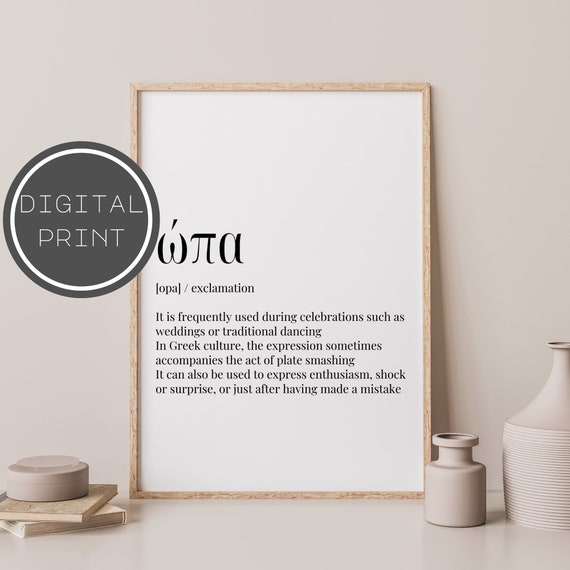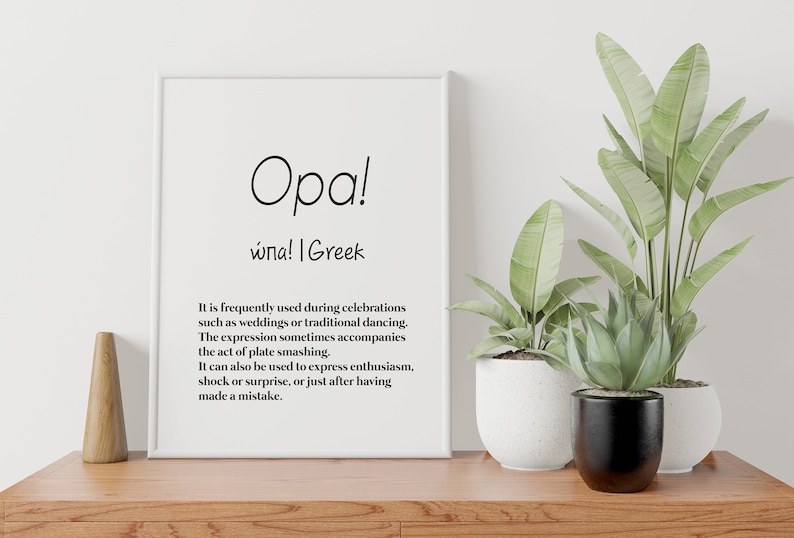Unlock The Meaning Of "Opa" In Greek Culture!
Have you ever been swept away by the sheer exuberance of a Greek celebration, the air thick with music, laughter, and the smashing of plates? That spontaneous cry of "Opa!" is more than just a sound; it's a vibrant expression of the Greek spirit, a word brimming with history, emotion, and cultural significance.
As a seasoned travel agent, I've had the privilege of immersing myself in diverse cultures across the globe. Among the countless customs and expressions I've encountered, the Greek word "opa!" holds a special fascination. Its versatility is remarkable, adapting its meaning to the context in which it's uttered. This article aims to uncover the multifaceted meaning of "opa," exploring its origins, its role in Greek celebrations, and its deeper cultural implications.
The exclamation "opa!" resonates deeply within Greek culture, acting as a powerful conduit for expressing a wide range of emotions. It's the sound of unbridled joy, the shout of surprise, and the cry of excitement all rolled into one. Imagine a traditional Greek wedding, the air filled with the rhythmic strains of music and the swirling movements of dancers. As the tempo rises and the energy peaks, someone inevitably shouts "opa!" while dancing the traditional Zorba, releasing a surge of shared exhilaration.
- Everything About Sd Movies Point Acethinker Mirror More
- Masahubcomco Legit Traffic Competitors Business Caution
But "opa!" is not confined to joyous occasions. It can also serve as a lighthearted expression of surprise or even a playful acknowledgement of a minor mishap. Similar to the English words "oops" or "ope," it can be used to soften the blow of a clumsy moment. The context, as always, is key to understanding the intended meaning.
The term "\u038f\u03c0\u03b1" (opa) transcends geographical boundaries, echoing through various Mediterranean, Eastern European, Middle Eastern, North African, South Asian, Latin American, and even Hebrew cultures as a potent emotional expression. It's a common thread woven into the fabric of celebrations, particularly weddings and traditional dances, adding a layer of shared cultural understanding.
In Greek culture, the exclamation "opa" is often intertwined with the symbolic act of plate smashing. This practice, though seemingly destructive, is believed to release pent-up emotions and usher in good fortune. The shattering of plates, accompanied by the resounding cry of "opa," becomes a cathartic ritual, a physical manifestation of letting go and embracing the future.
The essence of "opa" lies in its ambiguity. It's not easily translated into a single English word, as its meaning is fluid and dependent on the specific situation. It can be an exclamation of joy, an expression of surprise, a declaration of enthusiasm, or an affirmation of life. Its true power lies in its ability to capture a fleeting moment of intense emotion, transforming it into a shared experience.
The stereotype of the "lazy Greek" is a harmful and inaccurate caricature that fails to recognize the ambition and drive of the Greek people. Countless Greek women, in particular, are making significant contributions to various fields, challenging preconceived notions and inspiring future generations. These women are the embodiment of the Greek spirit, demonstrating resilience, creativity, and a relentless pursuit of excellence.
To delve deeper into the origins and significance of "opa," I recommend exploring the work of Alex Pattakos and Elaine Dundon (2015), who have extensively researched the word's cultural impact and its connection to the human quest for meaning. Their insights offer a valuable perspective on the profound significance of this seemingly simple exclamation.
While "opa" is a versatile expression suitable for many informal situations, formal settings may require a more refined approach. Fortunately, the Greek language offers several alternatives for conveying similar sentiments with greater formality. While there isn't a direct, one-to-one translation of "oompa" for formal situations, you can use other terms to convey the desired meaning in a polite and respectful manner. For example, expressing congratulations with sincerity or acknowledging an achievement with dignified praise.
In essence, "opa" is more than just a word; it's a cultural emblem, a symbol of the Greek joie de vivre. It's a reminder to embrace life's moments, to celebrate with gusto, and to find joy in the shared experiences that bind us together. So, the next time you hear the cry of "opa," allow yourself to be swept away by its infectious energy and immerse yourself in the vibrant spirit of Greece.
- Best Ways Where To Watch Movies Online Streaming Guide More
- Filmyfly Ip Data Streaming Guide Bollywood Buzz Today

Opa Definition Greek Words Zorba Dance Greek Dance Opa Etsy Australia

Opa GREEK Word Definition Home Decor Printable Poster Digital Wall Art

Opa! What Does the Greek Word Really Mean? Opa, Greek words, Words